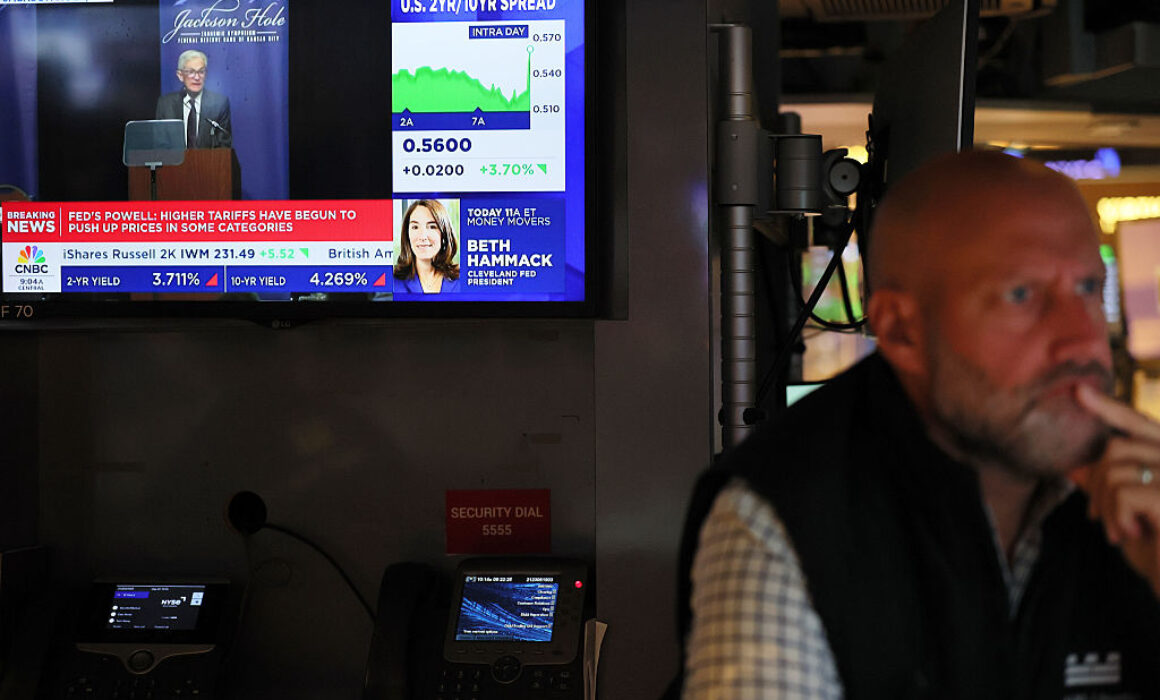How Trump’s Fed Politicization Could Drive Up the Cost of Living
August 29, 2025
We break down the broader consequences of an illegal firing attempt.
The Roosevelt Rundown features our top stories of the week.

Photo by Michael M. Santiago/Getty Images
Trump Threatens the Fed—and the Entire Economy
President Trump’s illegal attempt to fire Federal Reserve Governor Lisa Cook could easily lead to higher prices and drive up the cost of living, Roosevelt Principal Economist Michael Madowitz said in a statement this week. By attempting to remove a Fed governor, Trump undermines the congressional authority that set the central bank’s mandate 50 years ago, to ensure maximum employment and price stability. “Central banks insulated from politics are a cornerstone of successful economic policy worldwide,” Madowitz said. “That helps explain why Fed independence has helped keep inflation under 3 percent, while, after years of political interference in their central bank, Turkey’s inflation rate is over 33 percent.”
Former Roosevelt fellow Lev Menand also spoke with Bloomberg’s Odd Lots podcast about the significance of this unprecedented attack: “It’s not just about having optimal long-term monetary policy, it’s also about preventing one person from controlling way too much.”
This is not the president’s first attempt to consolidate power over the Fed—he has also repeatedly indicated his desire to remove Fed Chair Jerome Powell, even threatening to sue him earlier this month. Earlier this summer, the Supreme Court upheld Trump’s dismissal of officials from two other independent agencies—the National Labor Relations Board (NLRB) and the Merit Systems Protection Board (MSPB)—but added a flimsy protection for the Federal Reserve. As Sarah Bloom Raskin warned on the Roosevelt Institute blog in May, “This decision renders the Fed more vulnerable to political threats, not less.”
The US Is Now a Shareholder in Intel
Last Friday, Trump announced that leftover grant money from the CHIPS and Science Act would be used by the government to purchase an equity stake in the technology company Intel. This is not just another erratic move by the president; it’s in line with the global trend of government efforts to shape markets—which, when done intentionally, can be in the public’s interest. “If the public is going to be putting up the money, the public deserves more of the upside to that investment, if and when it pans out,” Roosevelt’s Todd N. Tucker told Marketplace.
The question, however, is whether this administration will act in the best interest of the American people. In June, Tucker spoke with NPR about Trump’s “golden share” purchase of Nippon Steel, noting that a “good version” of the move would be “a future administration pushing the steel industry into doing green steel.” But if the administration’s investment and business decisions look anything like its erratic economic policy, the ownership stake “could also run the risk of some corruption.”
Will Trump’s FTC Defend the Noncompete Ban?
Federal Trade Commission chair Andrew Ferguson has not committed to defending the FTC’s rule to ban employers from including noncompete clauses in employee contracts—which prohibit workers from seeking similar jobs at competitors after leaving their current position. “When we put the rule before the public, roughly 25,000 out of 26,000 comments supported our ban,” writes Roosevelt President and CEO Elizabeth Wilkins, who previously led the FTC’s policy office, in an op-ed for Otherwords. The ban was popular—noncompetes drag down wages, choke innovation in the economy, and make consumers worse off. It was set to go into effect in 2024 but has since faced legal challenges from corporate interests. “Failing to defend the noncompete ban would fall into this administration’s broader pattern of protecting corporate power while leaving working people behind,” writes Wilkins.
What We’re Talking About
What We’re Reading
- Trump promised to bring back manufacturing, but his economic policies so far have only brought uncertainty. “It’s almost impossible to keep up with the new deals, the new tariffs, the tariff cuts and the tariff hikes,” Todd N. Tucker told Capital & Main, calling Trump’s unpredictable agenda “the opposite of what companies need to be able to make long-term investments.”
- Tariffs, when used wisely, can be a tool for progressive policymaking. To learn more, read Tucker’s Roosevelt brief “How Should Progressives Respond to Trump’s Tariff Threats?”
- “Those who say the US economy is in good shape, I think, are underestimating the magnitude of the damage [Trump’s] policies are inflicting,” Roosevelt Chief Economist Joseph Stiglitz said in an interview with CNBC. “Not only his tariff policies, but his attack on the civil service, his attack on universities, his immigration policy—all of these are risks both to inflation but also to unemployment.”
- Roosevelt Fellow Osita Nwanevu spoke with the Boston Review about his new book, The Right of the People, and what he sees as “the core democratic idea: the governed governing.”
- “Our idea of democracy is so limited, focused on ballots and not on the way our institutions, including economic institutions, work—whether we’re actually equal within them,” Nwanevu says.
